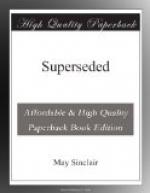So now, while Miss Cursiter stood explaining, ostensibly to the entire staff, the unique advantages of General Culture, it was to Rhoda Vivian as to a supreme audience that she addressed her deeper thought and her finer phrase. If Miss Cursiter had not had to consult her notes now and again, she must have seen that Rhoda Vivian’s mind was wandering, that the Classical Mistress was if anything more interested in her companions than in the noble utterances of the Head. As her grey eyes swept the tiers of faces, they lingered on that corner where Miss Quincey seemed perpetually striving to suppress, consume, and utterly obliterate herself. And each time she smiled, as she had smiled earlier in the day when first she saw Miss Quincey.
For Miss Quincey was there, far back in the ranks of the brilliant and efficient. Note-book on desk, she followed the quick march of thought with a fatigued and stumbling brain. She was painfully, ludicrously out of step; yet to judge by the light that shone now and then in her eyes, by the smile that played about the corners of her weak, tender mouth, she too had caught the sympathetic rapture, the intellectual thrill. Ready to drop was Miss Quincey, but she would not have missed that illuminating hour, not if you had paid her—three times her salary. It was her one glimpse of the larger life; her one point of contact with the ideal. Her pencil staggered over her note-book as Miss Cursiter flamed and lightened in her peroration.
“We have looked at our subject in the light of the ideals by which and for which we live. Let us now turn to the practical side of the matter, as it touches our business and our bosoms. Do not say we have no room for poetry in our crowded days.” A score of weary heads looked up; there was a vague inquiry in all eyes. “You have your evenings—all of you. Much can be done with evenings; if your training has done nothing else for you it has taught you the economy of time. You are tired in the evenings, yes. But the poets, Shakespeare, Tennyson, and Browning, are the great healers and regenerators of worn-out humanity. When you are faint and weary with your day’s work, the best thing you can do is to rise and refresh yourselves at the living wells of literature.”
Long before the closing sentence Miss Quincey’s Ms. had become a sightless blur. But she had managed to jot down in her neat arithmetical way: “Poets = healers and regenerators.”




